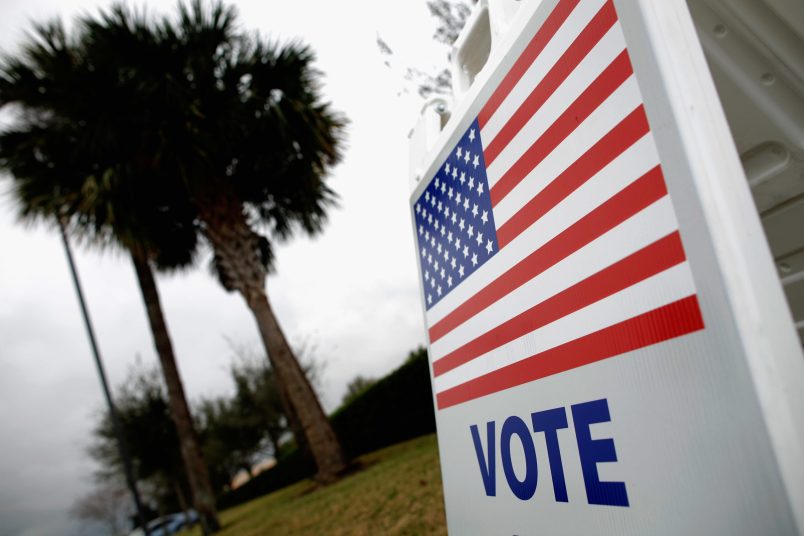This week, three states caved to election deniers’ newest conspiracy theory and withdrew from a multistate voter-registration program—even though officials in at least one of the states recently admitted that it actually helped them root out double-voting issues.
On Monday, Florida Secretary of State Cord Byrd announced that the state, alongside Missouri and West Virginia, would end its involvement with the Electronic Registration Information Center (ERIC), a D.C.-based nonprofit created by election officials to improve the accuracy of state voter rolls.
“As Secretary of State, I have an obligation to protect the personal information of Florida’s citizens, which the ERIC agreement requires us to share,” Bird said in a statement. “Florida has tried to back reforms to increase protections, but these protections were refused. Therefore, we have lost confidence in ERIC.”
Byrd cited perceived partisanship about the program – which is being pushed by some on the right – as his rationale for Florida’s pull-out. But just two months earlier, the Office of Election Crimes and Security (OECS), a unit launched within Florida’s Department of State last year, lauded the program for helping to identify over 1,000 potential cases of double-voting in its annual report.
“With Florida’s enrollment in [ERIC], the OECS has used data provided by ERIC to identify approximately 1,177 voters who appear to have voted in Florida and in one of the other member states, in the same election,” the report said.
So, what changed? Well, election deniers got involved. (The Florida Department of State did not immediately respond to a request for comment.)
Throughout January, the far-right media outlet Gateway Pundit published a series of blog posts accusing ERIC as being part of a liberal plot to control the democratic process, funded by the billionaire philanthropist-turned-right-wing-bogeyman George Soros and run by libs.
In reality, ERIC was founded in 2012 as a joint bipartisan effort between election officials in Colorado, Utah, Virginia, Washington, Delaware, Maryland and Nevada, with the help of election law advocate David Becker. It was designed to give states a way to compare voter data across state lines since there’s no national voter database.
Its funding was provided by the Pew Charitable Trusts, a nonpartisan nonprofit that once received a $500,000 contribution from Soros’ Open Society Foundations. Right-wing media have since seized on this donation as evidence of a liberal conspiracy, even though Pew hasn’t given money to the program since its founding. Soros himself has never given money directly to the program, either, according to ERIC executive director Shane Hamlin.
“We are a member-run, member-driven organization,” Hamlin wrote in an open letter published last Thursday. “State election officials—our members—govern ERIC and fund our day-to-day operations through payment of annual dues, which they set for themselves.”
Nevertheless, the coverage propelled ERIC to the roving spotlight of the right-wing media ecosphere, and prompted secretaries of state to withdraw from the program. Louisiana Secretary of State Kyle Ardoin, a Republican, withdrew in January 2022, while Alabama’s newly-elected Secretary of State Wes Allen made it his first official act this past January.
Florida, Missouri and West Virginia all cited “partisanship” as their reason for dropping out and protested (without naming him) Becker’s role in the program, even though he plays no active role in its day-to-day operations as a non-voting ex-officio board member.
Ohio Secretary of State Frank LaRose has since distributed a letter suggesting that he’d also drop from the program if they didn’t adhere to a list of reforms, including removing “ex-officio membership positions from ERIC’s bylaws”—again, targeting Becker.
However, as is the case in Florida, LaRose has applauded the program in recent weeks. Just a month ago LaRose called ERIC “one of the best fraud-fighting tools” that the country has.
“[I]t’s a tool that has provided great benefit for us,” he said during a February press conference, “and we’re going to continue to use it.”







Sigh
I remember when some states dropped ERIC to do Kobach’s disaster of a program only to rehire Eric to run Kobach’s list of false positives.
These fucking fuckers are so fucking tedious and toxic and I am so fucking tired of every last fucking one of them. Go get an idiotic but harmless hobby like yelling at clouds and STFU already.
One of the reasons exhaustion can set in is the constant demand to not only listen to the paranoid fantasies of conspiracy freaks but the demand to distort the functioning of institutions in an attempt to assuage their fears, an attempt that is never rewarded with success commensurate to the trouble it causes.
The new ACORN?
Our patchwork political system resembles a sunflower starfish that is beset by opportunistic microorganisms flourishing in overheated waters that is causing its body to rot and its limbs to float away.